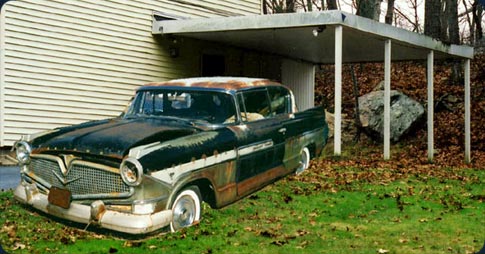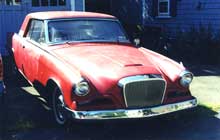Studebaker’s last new bodies came in 1953. In 1956 sedans were given more massive noses and tails in order to look contemporary, but a different approach was called for on the lithe, low coupe body. Instead, a more modest nose- and tail-job was accomplished with very little sheet metal change, just a new “bustle” trunk lid and a hood with a Mercedes-like grille.
In 1955 there had been nine different variations on the coupe, two levels of trim on the pillared coupe and one hardtop in both six-cylinder Champion and eight-cylinder Commander guise, plus one coupe and two hardtops in the President series. Top of the line, in President only, was the Speedster with special interior and dashboard, the latter with Stewart-Warner instruments on an engine-turned background. Many disliked ’55’s gaudy grille, but Bob Hope seemed very happy with his Speedster.
The Hawk line, as the 1956 coupes were called, comprised four models: Flight Hawk with six-cylinder engine, Power Hawk with Stude’s 259 cid 2-barrel V8, Sky Hawk with Stude 289 cid 4-barrel V8, and Golden Hawk with a 352 cid Packard V8 and Ultramatic transmission. The Power Hawk was pillared, the Sky and Golden Hawks hardtops. The Flight Hawk could be had either way. The Golden Hawk alone had modest fins, which close examination showed to be a quickie appliqué.
By 1957, Packard V8s were no longer manufactured and with fewer than 20,000 Hawks sold in ’56 Studebaker probably figured that four models were too many. So for ’57 there were just two: Silver Hawk and Golden Hawk. The Silver Hawk was a coupe, the Golden Hawk a hardtop, and both had more prominent fins, again an appliqué. The Silver Hawk had a choice of three engines, a six or two sizes of V8s. A Paxton supercharger enabled the 289 cid Golden Hawk to equal the Packard engine’s 275 bhp. Minor trim changes occurred for 1958, ‘59, ‘60 and ’61. The last Golden Hawks were 1958s; ’59s came only in Silver, after which the cars were simply “Hawks.” A Packard Hawk with unattractive fiberglass fishmouth was launched in 1958, but mercifully put down with the other Packard cars at year’s end.
The coupe’s svelte lines, originally penned by Bob Bourke of the Raymond Loewy studios, still looked good in 1962, but Studebaker had Brooks Stevens do an update. Modifications below the belt were modest; the principal change was a new formal roofline for the car introduced as the Gran Turismo Hawk. The dashboard was now faux woodgrain, and in 1963 the supercharged Avanti R2 engine, which made 289 bhp, became an option.
The 1964 GT Hawks exhibited little change, and the closing of Studebaker’s South Bend, Indiana, plants in December 1963 spelled the end of Hawk production. The model was not continued after all car operations were moved to Canada. The remarkable thing is that so little change was needed for the coupes to look contemporary in the mid-1960s. In fact they still look good today. From time to time I wish I still had mine.
No, Studebaker never built a Dove model, and despite the plethora of bird names in the car business I don’t think anyone else did either.

